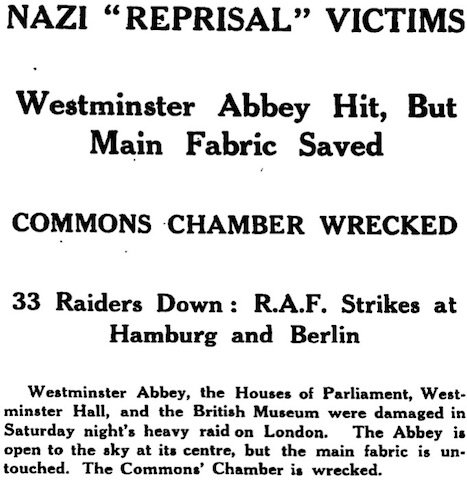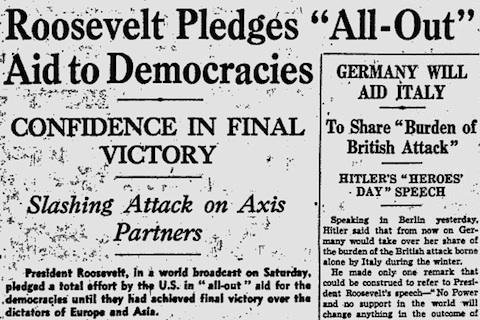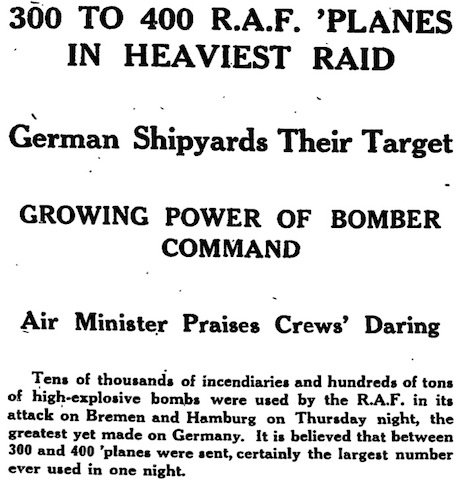
Saturday night's heavy air raid on London damaged some of its greatest buildings. Parliament were hit hard: the House of Commons is 'wrecked', in the words of the Manchester Guardian today; Westminster Abbey is 'open to the sky' (5), though its structure is still intact. Other historic buildings were hit too. From The Times (4):
What some consider the most magnificent roof in the world -- that of Westminster Hall, with its soaring arches and sweeping beams of oak -- has been pierced by bombs, and damage has been done to the interior. The hall was started by William Rufus in 1097 [...]
Big Ben's face was blackened and scarred, but although the apparatus which broadcasts the chimes was for a time put out of action, the hands of the clock continued without interruption telling the time to Londoners.
The Deanery of Westminster, one of the best examples of medieval houses in England, has been destroyed [...]
The British Museum was set alight by a shower of incendiaries, which burnt through the roof and set fire to the back of the building [...] Fortunately most of the treasures had been removed to safety, and the damage was comparatively light.
Is it a sign of increasing indifference that the human cost of the raid is relegated to a few paragraphs at the end of the article, or is just that the destruction in the heart of London was something that could not be underplayed?
One area of London received its worst battering of the war. A street corner of shops was bombed shortly before the raiders passed signal, and rescue parties worked feverishly in daylight to reach a number of people, estimated to be about eight, who were still beneath. A few had been released soon after the bombs fell. A policeman, mortally injured, died on admission to hospital. Not far away the ruins of a demolished block of flats entombed seven people.
There is some good news: London's air defences shot down 33 German bombers (29 by fighters, 4 by anti-aircraft guns). Such tallies are becoming reminiscent of the glory days of Fighter Command, back in September last year. Indeed, even before Saturday night's raid, Ernest Bevin, Minister of Labour, said much the same thing in a speech at Leeds (Guardian, 6):
"Get that up to a couple of hundred," he told his audience of men training as engineers, "and night fighting becomes as expensive to Hitler as day fighting was a year ago. Our bombers are growing in size and in carrying capacity. Our science is developing more rapidly than his. We are proud of our people. We are on the up grade. Never mind the croakers. We are winning and we are winning every hour.
No response is recorded, however, to his later question, 'Isn't it gratifying to realise that in the daytime at least you are safe?'
Bomber Command was out the same night as London was being hit so hard The main raid was on Hamburg, 'as effective as it was fierce':
pilots of the Bomber Command report immense damage throughout the city. Under a clear sky and helped by a full moon, our aircraft went in through the barrage to drop load after heavy load of high-explosives and incendiaries. Once again the industrial quarters and the whole spread of the docks were hammered and left blazing.
The bombing was deadly accurate, too:
Industrial plant and factories, their chimneys standing up like black nine-pins against the moonlit waterway, were easy targets for our bomb-aimers. Sticks of high-explosive bombs fell across goods yards and railway tracks, and yet more fires added to the destruction in the submarine building yards.
This is a view unlikely to be backed up by the German government, which described the London raid as '"a reprisal" for recent R.A.F. raids on Germany, "in which the R.A.F. repeatedly and deliberately damaged residential quarters of Berlin and other cities' (5).
Another sceptic (although for entirely different reasons) is Major General Giffard le Q. Martel, who commands the Royal Armoured Corps. He notes that 'We live on the land and we must beat them on the land' (6).
Bombing Germany cannot subjugate the Germans entirely, however hard you bomb them. The country is so vast. Bombing alone will never win the war.
He was speaking at an exercise on Salisbury Plain, presumably the same one described today by the military correspondent to The Times (5). It simulated a landing on the south coast by, initially, three German divisions whose objective was to secure a port for the disembarkation of a Panzer division. The defences' reserves included a motorised and an armoured division. The writer was very impressed with 'the skill and the realism with which it [the exercise] was mounted. The men were keen, the tanks are 'now coming along well, but there are still certain deficiencies to be filled up'.
The hitting power of the armoured fighting vehicle was illustrated not only by what it did but also by the effect of its near presence on other troops. Mr. Menzies was right when he said it was urgently necessary to increase our strength in this arm.
Now, let us turn to a more serious matter, namely the atrocious pronunciation of announcers on the BBC. H.D., writing to the Guardian from London, is prepared to let go when it comes to 'the "Latin longs and shorts"' (4).
But there are a few fixed things that we should surely maintain, and one of them is the inviolable rule that "g" before "a," "o," and "u" is pronounced gutturally and not like "j." Yet the B.B.C. systematically and invariably pronounces "margarine" "marjarine." They might as well say "one got or one tittle." If we must be vulgar, or let us say popular, let a short statute or "Dora" regulation be passed changing the spelling to "margerine" or, going the whole hog, changing the word to "marge"!
The arrival of mass media benefited nobody more than language pedants. Discuss.
![]() This work is licensed under a Creative Commons Attribution-NonCommercial-NoDerivatives 4.0 International License.
Permissions beyond the scope of this license may be available at http://airminded.org/copyright/.
This work is licensed under a Creative Commons Attribution-NonCommercial-NoDerivatives 4.0 International License.
Permissions beyond the scope of this license may be available at http://airminded.org/copyright/.





Pingback:
Airminded · Tuesday, 13 May 1941
Pingback:
Airminded · Thursday, 30 April 1942